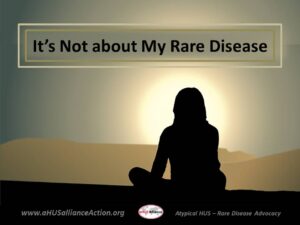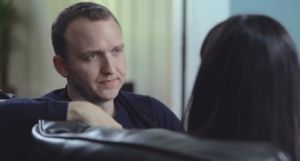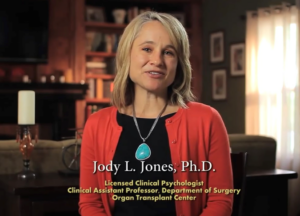Article No 368.
10 August 2020

It’s not about my rare disease…. it’s about all the things that go along with it.
The lack of understanding from others. The limited information available. The feelings of isolation, frustration, and guilt. The stress on relationships. The impact on my family and our lifestyles. The broad range of burdens – social, mental, economic.
Living with a rare disease can feel like a relentless, dull pain that feels like it’s never going to stop. For many rare diseases, there are few “expert centers” of care, no definitive diagnostic tests, no doctor’s office pamphlets. Sometimes we feel that others are judging us, and often our support wanes as time goes on and we’re not “cured” of our rare disease. While we’d love to find simple solutions for our rare disease, few understand that we and our doctors are continually search for insights and research in hope that new medical knowledge will yield more options and a brighter future.
Here’s a lighter look, but one that seems oddly applicable to rare disease families. As in this short video “It’s not about the Nail”, most people have experienced both viewpoints during life events of varied circumstances. What seems familiar from your perspective?
It’s Not about the Nail
Video by Jason Headley (2013, 1:41 minutes)

Click Photo to Watch (or click HERE)
Many rare diseases are lifelong or chronic conditions, and for rare diseases like atypical HUS there may even be relatively long periods of wellness. An estimated 70% of rare diseases are genetic, which can creates rare disease issues affecting families in myriad ways. Caregivers struggle to find a work-life balance, and strive to find time to keep appointments and treatment regimens on schedule. Relationships may suffer, and issues such as anxiety or depression may compound difficulties. Parents may feel guilt about the inherited genetics for their child, and the stress it places on the entire family. Adult patients may face certain limitations due to treatment issues and lifestyle issues, or struggle with the concept of deciding whether to have children when it’s possible to inherit the same genetic mutation. A rare disease diagnosis impacts all areas of their lives – not just medical aspects, for patients and for their entire family as well.
Empathy counts. Support counts. Cultivating a ‘can do’ attitude counts. We’re more than our rare disease diagnosis. A rare disease like aHUS does have limitations to work around, but it doesn’t have to limit us. Those aren’t throw-away slogans: instead, each is more of a battle cry announcing our unwillingness to adopt a ‘victim mentality’ and instead commit to taking up the attitude to live life as full of well-being as possible. While rare disease patients and their families work through the challenges of ‘life after diagnosis’, know that supportive people can make a positive difference in their lives but that we also must also accept the responsibility to help ourselves. We need to acknowledge restrictions, adhere to treatment plans, and be mindful of how our rare disease impacts various aspects of our lives and the lives of others. If we embrace a narrow definition of health as being ‘disease free’ our rare disease ‘wins’ when we give up battling for wellness. People with a rare disease can live full, productive lives that are happy and meaningful.
And what’s a battle without weapons? You’ve got people in your corner fighting alongside you: friends, family, your faith group, and your colleagues. You’re backed by scientists, medical professionals, and advocacy groups – many of which are grounded by initiatives and outreach which led by volunteers who are either adult patients or family caregivers themselves. In the case of aHUS (atypical HUS), some feel that their family lives with the Sword of Damocles hanging by a thread over our heads. This very rare disease can trigger unexpectedly, with life-threatening complications that can damage organs throughout the body. Much remains unknown about our disease adversary, and that thread can break at any moment – we know that we are genetically predisposed to aHUS, which may ramp up at any point throughout our lifetime. While we may have to live with this reality and admit to ourselves that we’re somewhat fearful that aHUS episodes might occur, patients and their families can work to ‘cultivate wellness’ rather than to live in fear. Our weapons in the fight against rare disease include awareness, knowledge and our commitment to work toward better days ahead for ourselves and others.
Everyone has struggles, and everyone benefits from support. How can you support a friend or loved one with a rare disease? Watch a video on this topic, which was created for an atypical HUS family conference (2014), and presented by psychologist Dr Jody L Jones.
Rare Disease Challenges: Support for Patients & Families
Click Photo to Watch (or click HERE)
Dr Jody L. Jones, Licensed Clinical Psychologist
Find what makes you peaceful, productive, happy, fulfilled. Think about what wellness means to you in areas that are mental and emotional as well as physical, and consider how you can work in a balanced manner toward those goals.
Try to see things our way. It’s not about our rare disease – it’s about everything related to our personal definitions of and commitment to well-being despite our diagnosis.
About the Author: Linda Burke lives in Maine USA and volunteers with atypical HUS advocacy efforts through the aHUS Alliance Global Action team. Her professional background is as a teacher in varied fields of science and mathematics, with an additional degree in educational leadership. As a family caregiver, Linda began contributing to international aHUS outreach and resource creation in 2009, a year after the death of her 5 yr old son and 10 months after her now-teenage son experienced his single-event aHUS episode. Although the Sword of Damocles still hangs over her family’s head, Linda strives to live an optimistic and meaningful life. On some days, in small ways, she even succeeds.


